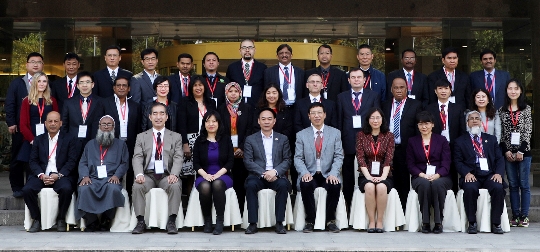Cooperation Network of Research and Academic Institutions on Sustainable Agricultural Mechanization established at Regional Workshop of CSAM

On 14th April 2017 in Nanjing, China, the “Asian and Pacific Cooperation Network of Research and Academic Institutions on Sustainable Agricultural Mechanization (ANRAIM)” was established at the ‘Regional Workshop for Research and Academic Institutions on Establishing a Cooperation Mechanism for Human Resource Development on Sustainable Agricultural Mechanization’.
The new Cooperation Network is a follow-up action of the 3rd Regional Forum on Sustainable Agricultural Mechanization in Asia and the Pacific organized by the Centre for Sustainable Agricultural Mechanization (CSAM) of the United Nations Economic and Social Commission for Asia and the Pacific (UNESCAP) on the theme of “human resource development for sustainable agricultural mechanization” in 2015 in the Philippines, where member countries called for such a regional cooperation mechanism.
The new initiative was launched to help meet the region’s need for promoting sustainable agricultural mechanization under the circumstances of persistent poverty, reduced availability of agricultural labour, demographic changes involving larger proportion of women and ageing agricultural workers in a number of countries, inefficient agricultural value chains, degradation of natural resources and the environment, and impacts of climate change. The Regional Workshop duly recognised the unique role that research and academic institutions could play in defining and leading the future direction of sustainable agricultural mechanization and the valuable outcomes that could be expected through an effective cooperation mechanism and innovative partnerships.
The mission of ANRAIM will be to promote sustainable agricultural mechanization in Asia and the Pacific by facilitating and enhancing cooperation among research and academic institutions in agricultural mechanization, thus contributing to attainment of the Sustainable Development Goals in the region including in the areas of food security, improved rural livelihoods and poverty reduction.
The identified cooperation priorities for ANRAIM include: 1) to establish a contact network for professors, researchers and engineers working on agricultural mechanization in the region; 2) to improve the dissemination and sharing of information, knowledge, technologies and research literature among research and academic institutions working on agricultural mechanization; 3) to facilitate joint research and innovation as well as joint development of project proposals for funding from international and domestic funding sources; and 4) to facilitate human resource development activities, including collaboration for visiting scholars, internships, tailored training, study tours, pilots, etc.
The Regional Workshop was co-organized by CSAM and the Nanjing Research Institute for Agricultural Mechanization (NRIAM) of the Chinese Academy of Agricultural Sciences (CAAS). CSAM and NRIAM will serve as the Co-Secretariats of the Network.
More than 30 participants representing 20 research and academic institutions from 14 countries attended the Workshop including the China office of the United Nations World Food Programme (WFP China). Dr. Qu Sixi, Representative and Country Director of WFP China, expressed his organization’s interest in collaborating with CSAM under the ambit of the new Cooperation Network as well as in other areas through South-South and Triangular Cooperation.
The Workshop participants also visited the Nanjing Research Institute for Agricultural Mechanization (NRIAM), the Jiangsu Agri-Expo Garden, and Jiangsu Liyang Haibin Agricultural Machinery Cooperative.
